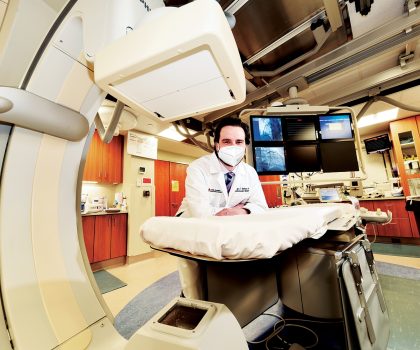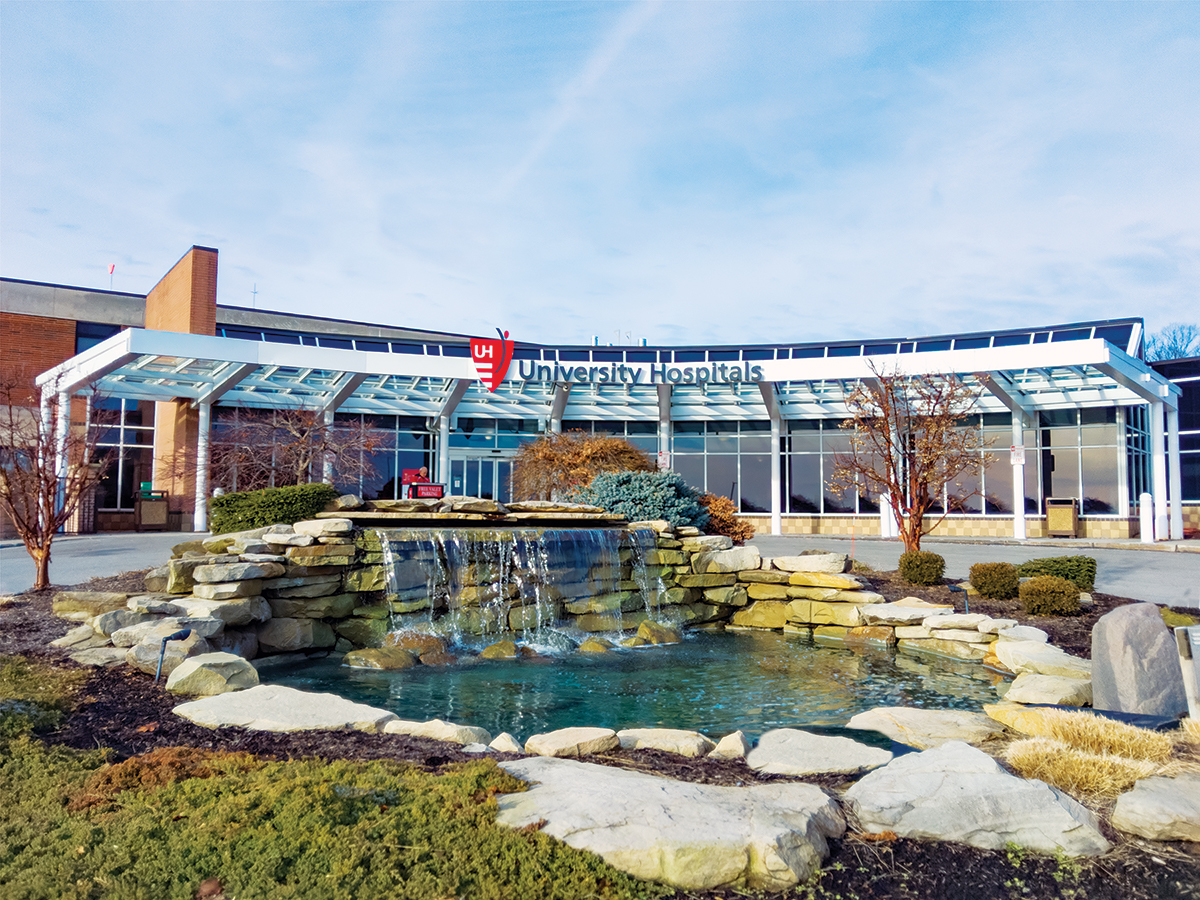Here’s how University Hospitals Geauga Medical Center is helping people stay on top of their heart health, safely

By Ken McEntee
Among the peripheral consequences of the Covid-19 pandemic is that many people with other medical conditions seem to be neglecting their own health, laments Gregory Stefano, MD, an interventional cardiologist and director of University Hospitals Harrington Heart & Vascular Institute at University Hospitals Geauga Medical Center.
Often those other medical conditions can be serious.
“There has been a 40 to 50 percent decrease in heart attacks reported nationally since the Covid-19 pandemic has started,” Dr. Stefano reveals. “It isn’t because people aren’t having heart attacks. It’s because they aren’t getting care for their heart attacks. It is very important that you do not neglect new or worsening symptoms of heart or vascular disease.”
“Silent” heart attacks can happen without the intense symptoms commonly associated with heart attacks. Ischemia, for example—a condition that causes restricted blood flow—may occur with mild or no symptoms. But it can cause lasting damage to the heart, Dr. Stefano cautions.
“Our population has been wonderful at following the governor’s orders by practicing social distancing, but many have not been taking care of themselves,” he says. “People are sometimes resisting medical attention to such conditions for fear that they’re going to get Covid-19 at a hospital or other medical facility. They can be assured that they will be safe if they need to come to UH Geauga Medical Center. Please don’t neglect one dangerous health problem to avoid another.”
Covid-19, Dr. Stefano says, has been shown to affect the heart in more than a third of patients worldwide in some way. Some patients may experience heart-related symptoms, without cough or fever, but most patients may be asymptomatic and may not know that they are at risk.
Dr. Stefano says UH Geauga Medical Center offers two ways to safely stay on top of their cardiovascular health:
- Telehealth, or a virtual visit, is an option that enables a person to consult with a doctor via phone or online video chat
- Personal visit to UH Geauga Medical Center
“We can provide instantaneous access to discuss any active health issue and then appropriately triage the care people need,” Dr. Stefano assures.
“UH Geauga Medical Center has not had a single incident of a person contracting Covid-19 at our facility. We, like the entire University Hospitals system, have been extremely active with universal screening, masking and social distance policies. Cleaning and sanitation are 24-hour-a-day activities here. Those efforts are paying off in keeping our hospital safe.”

The telehealth option, he offers, is a fast and convenient way to get medical attention via computer, phone or mobile device without leaving your home. University Hospitals has offered UH Virtual Visit for more than two years. Virtual appointments can usually be made almost immediately at any time of the day or night.
When you call to schedule a Virtual Visit, your provider will help to determine the best method for your care at that time.
“You can simply pick up the phone and say that you need to consult with a cardiologist and any other subspecialty,” Dr. Stefano explains. “We will then assess what we need to do from there.”
Telehealth visits, he advises are not intended for emergencies.
“If you’re experiencing the symptoms of a heart attack or stroke, you need to call 911 immediately,” he says. “Our ERs are open and have all of the necessary precautions in place to keep patients safe.”
Although it is conveniently located close to home in a friendly, intimate environment, the Harrington Heart & Vascular Institute at UH Geauga Medical Center can do any cardiac or vascular procedure except for open heart surgery—and can do it better than many larger hospitals, Dr. Stefano says, noting that the facility provides emergency treatment faster than at least 90 percent of the nation’s hospitals.
“Door to balloon time is measured from the time a patient gets to the Emergency Room to the time a balloon is inserted to clear a blocked artery,” Dr. Stefano explains. “The national standard is 90 minutes. Our average is 45 minutes, which is well above the 90th percentile nationally. We’re not a large hospital, but we do some pretty amazing things.”
Since 2007, the number of heart and vascular procedures at UH Geauga Medical Center has grown by 223 percent, and the center’s heart and vascular specialists now care for almost 2,000 patients per year.

“Our Heart and Vascular Diagnosis and Treatment Center, which underwent a major expansion a year ago, was designed and constructed in response to the growing need for these services in Geauga, Lake and Ashtabula counties,” Dr. Stefano says. “It positions UH Geauga Medical Center as a regional center for cardiovascular care, with increased capacity for emergency and outpatient cardiac and vascular care.”
You can schedule a UH Virtual Visit by calling 440-901-1937. UH Geauga Medical Center is located at 13207 Ravenna Road, in Chardon. You can learn more by visiting UHHospitals.org/locations/uh-geauga-medical-center.
